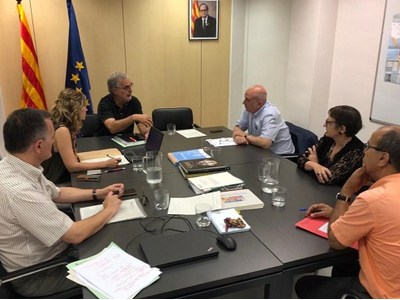- The inter-ministerial group will continue working to define the Catalan government’s competencies in this area

The Inter-Ministerial Working Group on Safe Harbours met today to continue work on a Catalan strategy for receiving rescue boats operating in the Mediterranean.
The working group first met in mid-April, following the government’s adoption in February of a resolution declaring Catalonia a safe harbour. At the follow-up meeting today, participants shared action protocols for dealing with the arrival of rescue boats in emergency situations. Five ministries are involved in the group’s work: the Ministry for Foreign Action, Institutional Relations and Transparency; the Ministry of Territory and Sustainability; the Ministry of Health; the Ministry of Labour, Social Affairs and Families; and the Ministry of Home Affairs.
The group met to identify the competencies and capabilities of the Government of Catalonia in emergency situations and discuss how to respond in such circumstances. The participants concluded that ports under the authority of the Catalan government are now prepared and equipped to provide humanitarian assistance, and that health protocols are ready to be deployed when the need arises. The Deputy Director-General for Ports and Airports, Francesc Macias, explained the scenarios envisaged by the Catalan government, noting that the official way for a rescue boat to enter a port and bring migrants ashore is within the framework of an agreement with the state, which has key powers relating to migrants rescued in the Mediterranean, such as the power to authorise their disembarkation and border control. At the same time, he stressed that Catalonia is prepared to respond effectively at an operational level, in terms of both port activity and health care provision.
Manel Vila, Director-General for Development Cooperation, emphasised the primacy of international humanitarian law, as the case involving the arrest of the captain of Sea Watch 3, Carola Rackete, has clearly shown. A Naples judge ordered her release in early July, ruling that the captain of the rescue boat had been fulfilling a duty when she docked without permission at the port of Lampedusa. The judge considered that obligations with respect to humanitarian rescue take precedence over state legislation (Italian legislation in this case).
A European priority
A specialist from the Delegation of the Government of Catalonia to the European Union who attended the meeting stressed that declaring Catalonia a safe harbour was in line with the priorities defined in EU migration policy. At an informal meeting of EU ministers held in Paris on Monday, 14 member states approved a temporary mechanism to enable the disembarkation of migrants rescued in the Mediterranean, and eight agreed to actively take part in its deployment. The eight active participants do not include Spain. The EU policy line is a good fit with the government’s resolution declaring Catalonia a safe harbour, and the working group will take steps to ensure that European institutions are aware of it.
In the short term, the Working Group on Safe Harbours will continue working to define the Catalan government’s competencies in this area and translate them into concrete actions that build on Catalonia’s history as a “land of welcome” and cement its status as a safe harbour.